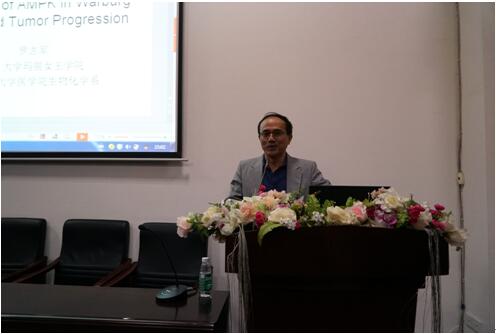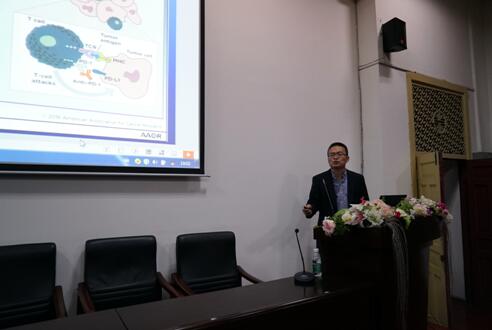In the afternoon of Oct. 31, 2017, Prof. Zhijun Luo and Rutao Cui from Boston University of the United States were invited to give an academic seminar in our institute. The report was held in the Lecture Hall of the fifth teaching building with more than 100 teachers and students attended the lecture.

Prof. Luo on the Lecture
Prof. Luo presented a report entitled“The Role of AMPK in Warburg Effect and Tumor
Progression”. He elaborated on the role of AMPK in Warburg effect and tumor progression and pointed out that LKB1/AMPK is an important pathway regulating the metabolism of cell, which can inhibit the synthesis of proteins, fatty acids and glycogen, promoteglycolysis, fatty acid oxidation and glucose uptake and thus inhibit tumor development. Prof. Luo and his team have explored the specific mechanism of AMPK in inhibiting Warburg Effect and found out that AMPK can promote mitochondrial synthesis. If AMPK is artificially targeted at mitochondria, it can promote the oxidation of fatty acids as well as inhibit the glycolysis and thus inhibit the growth of cells. Prof. Luo explained the associations between AMPK, TGF-β signaling pathway and tumor development in detail. LKB1/AMPK pathway can inhibit TGF-β signaling pathway and the effects of TGF-β signaling pathway on inducing tumor metastasis. Meanwhile, LKB1/AMPK pathway also inhibits mRNA and protein levels of TGF-β as well as the effects of TGF-β in promoting the transition of epithelial-mesenchymal. In LKB1 / AMPK pathway, the expression level of p-AMPK is negatively related to tumor progression, while TGF-β expression is positively related to tumor progression.

Prof. Cui on the Lecture
Prof. Cui gave a report entitled "Signal Transduction in Melanoma Development", he mainly described the role of MC1R in melanogenesis and occurrence of melanoma. MC1R is a receptor for melatonin and a key gene that determines hair color. Prof. Cui and his team found that the lack of MC1R exacerbates the cell premature induced by UV in normal melanocytes and induces cancer cell transformation in case of the activation of other proto-oncogene. After the irradiation of UV, MC1R can bind to PTEN and protect its activity. Prof. Cui explained the mechanism of how ZDHHC13 regulating the MC1R palmitic acid acylation in detail and pointed out that Plam-B, a small molecule inhibitor, can promote palmitoylation and inhibit the malignant transformation induced by MC1R-RHC subtype. The achievement of Professor Cui team has great significance in the prevention of melanoma in light-colored human with MC1R-RHC subtype.
After the report, teachers and students actively raised questions and the atmosphere was active. The two professors actively exchanged their ideas with our teachers and students.
CV of Professor Zhijun Luo:
Professor Zhijun Luo is employed in the Boston University School of Medicine, as lecturer, assistant professor, associate professor. He is a PhD of the United States Einstein Medical College and a postdoctoral fellow at Harvard University. Pro Luo has been employed by Nanchang University since 2011. He is the former vice president of School of Medicine in Nanchang University, the former president of School of basic medicine in Nanchang University and now is the president of Queen Mary College. His research field involves the mechanism of Raf kinase activation and the biological function of Raf, the role of AMPK in regulating the metabolism and growth of tumor cells. He has published more than 70 high-level papers, including NATURE, NEURON, MOL CELL, CELL METAB, EMBO J, PNAS, etc. The total reference rate is more than 6800 times. He is also a former editor of JBC and former judge of NIH in United States.
CV of Professor Rutao Cui:
Rutao Cui, M.D., Ph.D. Professor of Pharmacology and Dermatology, Vice Chair for Laboratory Administration; Director, The Laboratory of Melanoma Research in the Section of Cancer Pharmacology; and Member, The Cancer Center.Dr. Cui’s primary research interests include: understanding molecular mechanisms of melanoma development, defining the molecular effects of UVB radiation on melanocyte growth and differentiation, and developing murine genetic models for human melanoma.